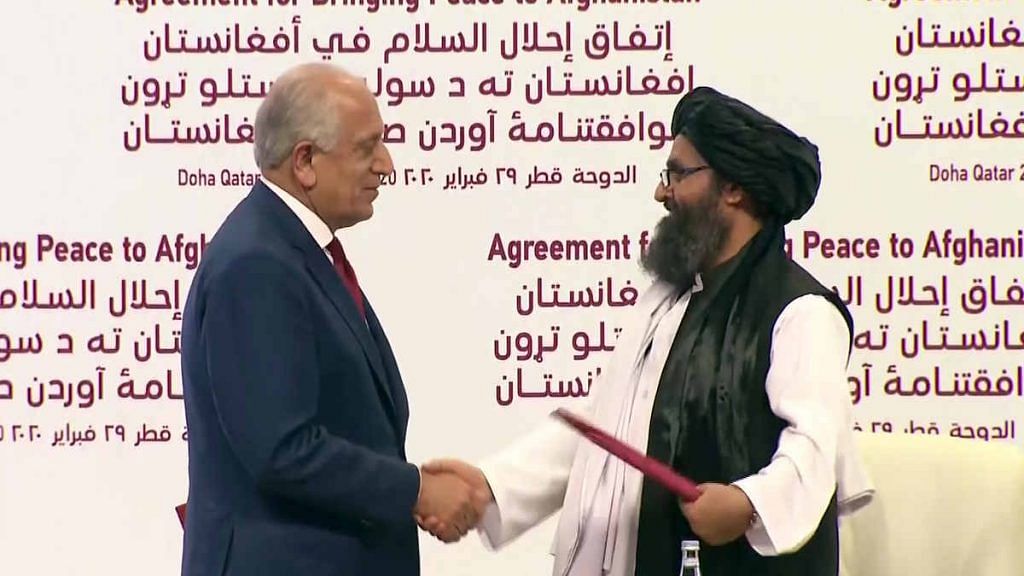When two former Indian diplomats, Amar Sinha and TCA Raghavan, went to Moscow to participate in a November 2018 meeting that the Russians were holding with the Taliban, they were expressly told by the MEA to keep engagement with the Taliban to a minimum.
It was the oddest fatwa. A diplomat was being told not to do what he/she has been trained to do best, for several decades — to chat-up people who don’t agree with you and try to convert them to your side.
But the Ministry of External Affairs (MEA) thought it would be betraying its friends in Kabul, from President Ashraf Ghani to former President Hamid Karzai, if they were to be seen to hanging out with their enemies, the Taliban.
Moreover, Pakistan was midwifing the peace process, giving up Mullah Baradar (who signed the deal last week with the US) after keeping him in a Karachi jail and halfway house for nearly nine years.
Also read: Why India should leave Afghanistan to Pakistan as US signs peace deal with Taliban
The world and the Taliban
How could India, which has refused to have anything to do with Pakistan until cross-border terrorism comes to an end, become part of a process in which Pakistan held several of the top cards?
It didn’t matter to the Narendra Modi government that the Taliban was being wooed by countries all over the world, that US President Donald Trump’s special envoy Zalmay Khalilzad, an Afghan himself, was brokering the deal with it. (Khalilzad signed the deal last week with Mullah Baradar). That Russia’s Special Representative Zamir Kabulov was wholly involved in the negotiations, including making space for Pakistan. That China, UK, Germany and several other European nations had named special envoys to Afghanistan, who would routinely travel to Kabul to meet all sides, including the Taliban — and also drop by in Islamabad and Delhi.
Also read: US-Taliban deal was like watching ‘Pakeezah’ after a long wait, says Jaishankar
India stays away
Only India, with such enormous stakes in Afghanistan, steadfastly refused to not only appoint a special envoy but also point-blank refused to talk to the Taliban. Why?
Delhi had become so principled, elevating itself to such a high moral ground that it began to believe its own rhetoric. “India’s consistent policy has been that such efforts should be Afghan-led, Afghan-owned and Afghan-controlled and with the participation of the Government of Afghanistan,” spokesperson Raveesh Kumar said in 2018, as Sinha and Raghavan prepared to travel to Moscow.
Surely, it needn’t have been this way. As India’s ambassador to Qatar P. Kumaran watched Khalilzad and Baradar sign a pact in Doha last week, which lets the US and NATO allies leave over the next 14 months (the US will keep about 8000 troops), it was surreal to see that India had preferred to stay out of Afghanistan’s future rather than dirty its hands by playing all sides.
Also read: Five key aspects of the US-Taliban peace deal decoded
India’s old ties
So what was this Brahminical view of the world that South Block was pushing? Certainly, PM Modi has no qualms about talking to anyone — except Pakistan — so what was the refusal to talk to the Taliban about?
Perhaps, today’s BJP government should take a leaf out of the Atal Behari Vajpayee government. Soon after then external affairs minister Jaswant Singh travelled to Kandahar to talk to the Taliban to release the hijacked passengers of IC-814, Taliban’s foreign minister Wakil Ahmed Muttawakil had told this reporter: “We are Pashtun. We have old ties with Hindustan. That is why we helped with the release of the passengers.”
Muttawakil, of course, had his own reasons, but what he said wasn’t entirely untrue. The Pashtun tie with India is as old as the hills — or at least Tagore’s evocative short story Kabuliwalla.
Over the last several decades as the world changed — with the invasion of Afghanistan by the Soviet Union in 1979, the US embrace of Pakistan to fight the godless Communists through the 1980s, the Soviet exit in 1989 and the disintegration of the empire in 1991, the rise of the Taliban and the hanging of Afghan President Najibullah in 1996, the subsequent takeover by the Taliban and the US bombing of Afghanistan in 2001 — India kept pace with the tortuous turns of history. Strategy forced New Delhi to cultivate the Northern Alliance, which under Ahmed Shah Masood was the only organisation capable of fighting the Taliban, but old Afghan hands never forgot the Pashtun.
Fast forward to the present. If America, which lost more than 2,000 lives and spent more than $2 trillion in the last 19 years in Afghanistan, could still bite its tongue — as did the Russians — and cut a deal with the Taliban that is Pashtun, what was India’s problem?
Reacting to the US-Taliban agreement on 29 February, the MEA admitted, “The entire political spectrum in Afghanistan has welcomed the pact…” Then, as it attempted to recover lost face, it made matters worse.
“As a contiguous neighbour, India will continue to extend all support to the Government and people of Afghanistan in realising their aspirations…” the statement added,
Official sources indicated that because India claimed Pakistan-Occupied Kashmir to be a part of India, it followed that Afghanistan was a next door — or, contiguous —neighbour.
The old question surfaced. How long will it take for Delhi to separate fact from claims and memory from desire? In 1947, India stretched from the Durand Line on the Afghanistan-Pakistan frontier to Cox’s Bazar in the Bay of Bengal. Then, the country got partitioned. Things changed. New countries came into being. But once the 1999 Kargil conflict ended, Jaswant Singh intoned, “Map-making in the subcontinent must come to an end.”
By making itself a “contiguous” neighbour of Afghanistan today, is India giving the Rashtriya Swayamsevak Sangh’s concept of “Akhand Bharat”, which incorporates both Pakistan and Bangladesh, a new lease of life?
